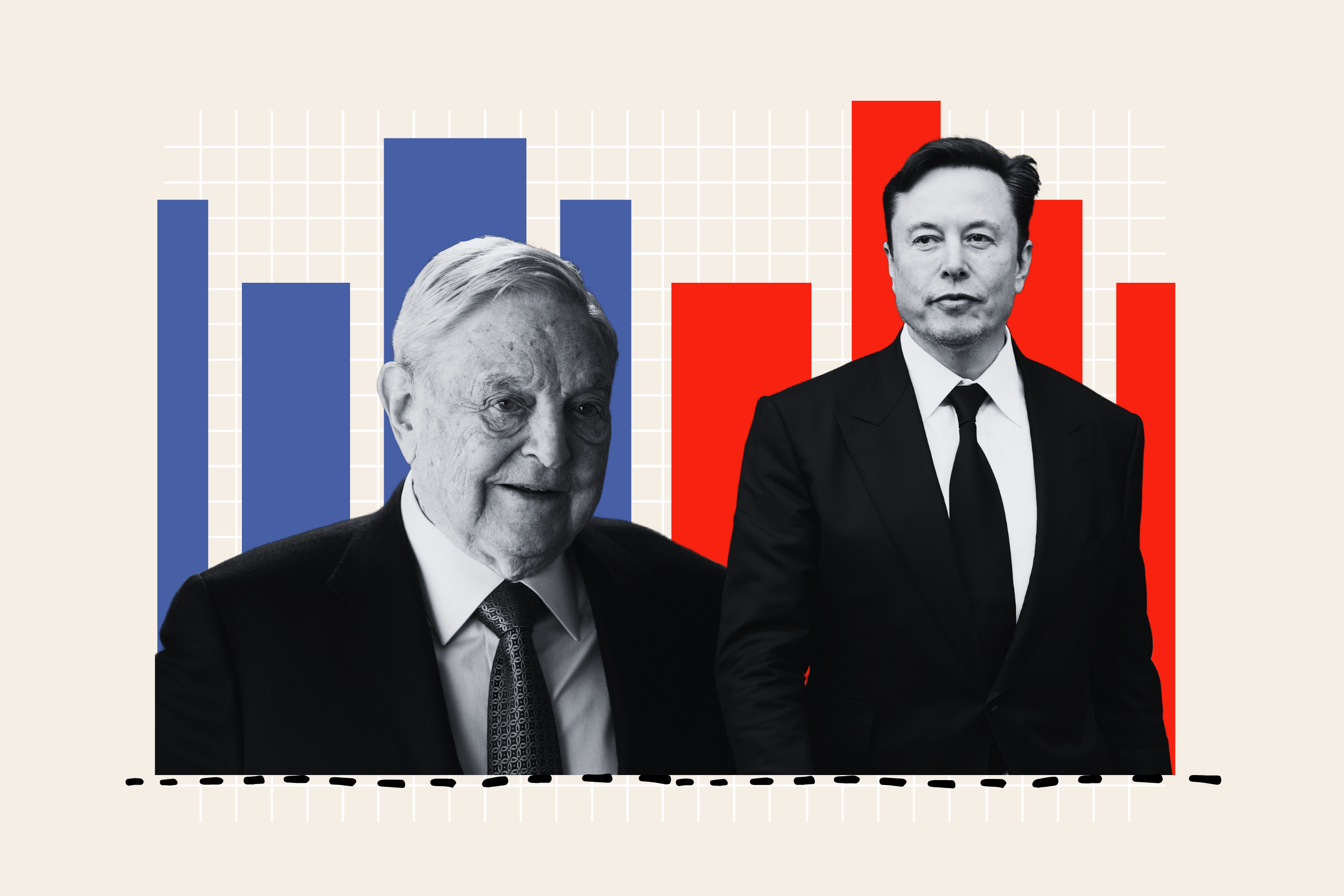What’s New
Elon Musk has been increasingly compared to billionaire George Soros as the tech mogul looks to continue pushing his influence into political parties across Europe and targeting district attorneys in the United States.
What To Know
Musk noted the comparison and commented on it during a speech at Mar-a-Lago, President-elect Donald Trump’s Florida estate, on Nov. 14, in which he said: “I guess someone’s got to be the George Soros on the right.”
“I mean, I’d call myself George Soros of the center, I think,” he said. “We obviously need to have just the basics. As President Trump rightly said, what we need is the restoration of common sense.”
“We want safe cities, we want secure borders, sensible spending, freedom of speech, respect for the Constitution,” Musk argued. “If that’s George Soros of the right, that’s me.”
“It’s going to be the most transformative presidency, perhaps since the founding of the country … It’s going to be a revolution.”
Full remarks from Elon Musk at Mar-a-Lago, on November 14, 2024.
“I guess someone’s got to be the George Soros on the right. I mean, I’d call… pic.twitter.com/1x8RcpMCjQ
— ELON CLIPS (@ElonClipsX) December 4, 2024
Right-wing politicians for years have set up Soros as a political bogeyman due to his donations to liberal and progressive causes through his nonprofit Open Society Foundations (OSF). The far-right have generated numerous conspiracy theories about Soros trying to buy influence and shape politics – often with antisemitic tones.
A video of British Member of Parliament (MP) Richard Tice, who now serves as the Deputy Leader of Reform UK, resurfaced on X, formerly Twitter, comparing comments he made in 2018 disparaging Soros to recent comments he made about Musk.
In 2018, Tice, then a member of the Conservative Party, said of Soros: “He doesn’t live here, he doesn’t pay taxes here, what right has he got to interfere with our democracy and try and overthrow the government? He has no right at all.”
Compared to his 2024 comments about Musk, in which he said: “If Mr. Musk can legally donate and he feels that’s the appropriate thing to do, then obviously we’d be delighted. It would be a fantastic endorsement of our policies to save Britain and get Britain growing again.”
Tice defended his comments, writing on X on Friday that the “big difference” is that “Musk has major business interests in U.K. employing thousands of people. Soros did not. Not hard.”
Is Elon Musk The ‘George Soros of the Right’?
Photo-illustration by Newsweek/Getty
Musk on Nov. 3, just days before the 2024 U.S. presidential election, posted a clip of MSNBC’s Claire McCaskill criticizing his involvement in the Trump campaign and wrote: “Funny that she has never said a word about Soros, who has cumulatively put a hundred times more money into elections than I have. If I can figure out [rocket emoji] science with Space X and [brain emoji] surgery with Neuralink, then maybe I can figure out politics too.”
Musk faced criticism in 2023 when he compared the billionaire to the fictional X-Men villain Magneto, who is written as a Holocaust survivor while Soros is a real-life survivor and separately claimed that Soros “hates humanity.”
However, Musk also expressed interest in meeting with Alex Soros, George’s son, who will take over OSF. Alex responded positively to the suggestion, saying he was “open to meeting.”
Newsweek reached out to Soros through the Open Society Foundations and to Musk through X and Tesla press teams by email on Saturday afternoon for comment.
What People Are Saying
Alan Mendoza, executive director of the U.K.-based Henry Jackson Society think tank, told Newsweek: “Musk’s detractors on the Left will indeed use similar arguments to those seen from the Right about George Soros to explain their disdain for his political interventionism.”
“But those same people on the Left will champion Soros and his campaigning as a force for good, just as those on the Right now welcome Musk. As always, one person’s ideological terrorist is another’s freedom fighter, and the loudest squeals of protest at any given moment will always be heard from the side that is being financially outgunned in the game of global influence of ideas.”
Nigel Farage, Reform U.K. leader following the meeting with Musk said: “We did discuss money. That’s a negotiation we will go back and have again. He is not against giving us money. He hasn’t fully decided whether he will.”
A Reform UK spokesperson in a statement on Saturday to Newsweek said: “Elon Musk is a very successful businessman with UK companies and is entitled to donate through any of them under British electoral law. Labour and the Conservatives have taken many millions in donations using the same rules. Elon Musk understands that we only have one more chance left to save the West.”
Fox News Host and conservative commentator Mark Levin on X wrote: “How come the media relentlessly and dishonestly scrutinize Elon Musk but give George and Alex Soros a pass? Rhetorical.”
Brian Krassenstein, a Trump-critical entrepreneur, on Nov. 13 wrote on X: “Person at Mar-a-Lago this evening: ‘Where is the George Soros of the Right?’ Elon Musk raises hand. Wait, so is George Soros good or bad, or does it just depend on if you agree politically or not?”

Senior Vice President, Corporate Lending Brown Brothers and Harriman Lewis Hart, Designer Maxwell Osborne, non-profit executive and philanthropist Alexander Soros, VP at NASDAQ OMX David Wicks and Designer Dao-Yi Chow of The Gordon Parks Foundation attend the NASDAQ Opening Bell at NASDAQ on May 20, 2016 in New York City.
Ilya S. Savenok/Getty Images
Why It Matters
The comments come to light as Musk looks to flex his political and financial muscle in a way that might have seemed unlikely prior to the 2024 presidential election. The tech tycoon played a pivotal role in President-elect Donald Trump’s re-election thanks to his influence and $277 million in donations.
Musk will try to repeat the feat with Reform UK – the party of UKIP mastermind Nigel Farage – with plans to back the party with a staggering donation upwards of $127 million, which would rank as the largest donation in British political history, according to The Times of London.
However, Farage told GB News that those discussions, which took place at Mar-a-Lago, are far from conclusive and will continue as the party plans its future: Having taken five seats in the U.K.’s 2024 snap election, Farage set his sights on replacing the Conservative Party.
Farage in a letter to Conservative County councilors urged lawmakers to abandon the party and join his Reform UK, seeking to establish a powerful ground game ahead of May’s local elections, the BBC reported.
However, Reform UK is not the only party that appears to have drawn Musk’s attention: In a post on social media platform X, Musk wrote: “Only the AfD can save Germany.”
The Alternative for Germany party, known locally as AfD, has been classified by German intelligence as a suspected extremist organization, The Washington Post reported. German elections will take place in February after German Chancellor Olaf Scholz suffered a loss in a vote of no confidence last Monday.
An AfD spokesperson has previously told Newsweek that the organization is “not a Right-wing extremist party.”
AfD has already gained much attention for its anti-immigration, anti-Ukraine and anti-Europe rhetoric. The party won its first state election in September, marking the first such victory since the end of the Nazi party 85 years earlier, largely seeming to do so on the back of deep dissatisfaction with Scholz and his government.


